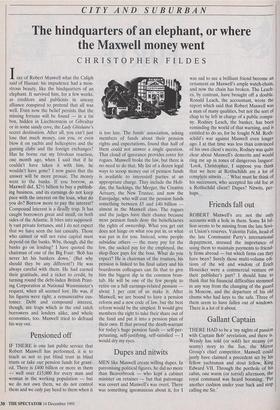CITY AND SUBURBAN
The hindquarters of an elephant, or where the Maxwell money went
CHRISTOPHER FILDES
Isay of Robert Maxwell what the Caliph said of Hassan: his impudence had a mon- strous beauty, like the hindquarters of an elephant. It survived him, for a few weeks, as creditors and publicists in uneasy alliance conspired to pretend that all was well. Even now the belief persists that the missing fortune will be found — in a tin box, hidden in Liechtenstein or Gibraltar or in some sandy cove, the Lady Ghislaine's secret destination. After all, you can't just lose that much money, can you, or even blow it on yachts and helicopters and the gaming clubs and the foreign exchanges? Has he borne out my frivolous reaction, one month ago, when I said that if he couldn't have taken it with him, he wouldn't have gone? I now guess that the answer will be more prosaic. The money went to the banks. If you borrow, as Maxwell did, $21/2 billion to buy a publish- ing business, and its earnings do not keep pace with the interest on the loan, what do you do? Borrow more to pay the interest? Compound interest is a deadly trap. It has caught borrowers great and small, on both sides of the Atlantic. It bites into supposed- ly vast private fortunes, and I do not expect that we have seen the last casualty. Those who cannot or will not raise capital must depend on the banks. Why, though, did the banks go on lending? I have quoted the chairman of one of the Big Four: 'Bob has never let his bankers down.' (But why should they be any different?) He was always careful with them. He had earned their gratitude, and a ticket to credit, by turning round the debt-laden British Print- ing Corporation at National Westminster's request, when all seemed lost. He was, if his figures were right, a remunerative cus- tomer. Debt and compound interest, though, are traps which in the end catch borrowers and lenders alike, and whole economies, too. Maxwell tried to defraud his way out.


































































 Previous page
Previous page